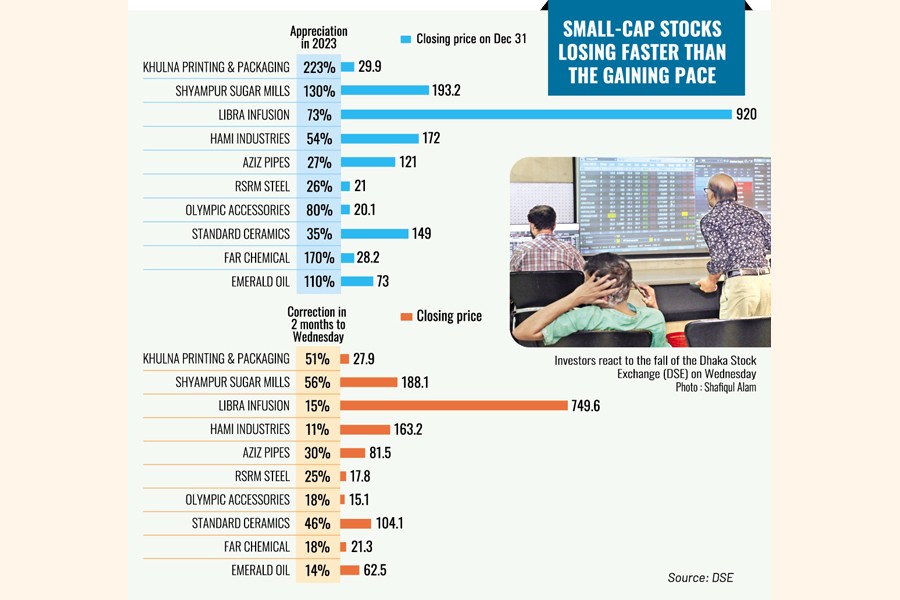DSEX sinks to 3-year low as investors optimise scope of liquidating assets

Published :
Updated :

Stocks witnessed another sharp decline, with the benchmark index of the Dhaka Stock Exchange sinking below 5,800 after three years, as local and foreign investors continued sell-offs to safeguard their investments from further erosion.
Market experts say the market faced another blow as the majority of investors wanted to get rid of their holdings that had remained stuck on the floor for a long period of time.
Stocks, which had seen unusual price hikes before the floor price removal, also kept sliding in waves of correction.
In the last two years, most investors chased speculative stocks while large-cap stocks endured a liquidity crisis.
Five most-valued stocks -- Grameenphone, BAT Bangladesh, Walton, Renata, and Robi -- which have significant influence on the market index eroded 11 per cent to 35 per cent after the regulator lifted the price restriction.
Substantial price erosion of large-cap stocks dragged the Dhaka Stock Exchange (DSE) by 574 points or 9 per cent, while it lost Tk 1.09 trillion in value after the withdrawal of floor price.
The corrections witnessed by a majority of small-cap companies having weak fundamentals have also left an impact on blue-chip stocks, said Md. Ashequr Rahman, managing director of Midway Securities.
Khulna Printing & Packaging, for example, experienced a 223 per cent price appreciation in 2023 and then underwent a 51 per cent correction in the last two months.
Other junk stocks, such as Shyampur Sugar Mills, Libra Infusions, Hami Industries, formerly known as Imam Button Industries, and Aziz Pipes witnessed price appreciation up to 130 per cent in 2023.
These companies lost prices up to 56 per cent between February and March this year.
When the floor price was in place, the loss-making companies saw huge liquidity as it was easy for market players to manipulate the share prices with limited funds, said Mr Rahman.
Many general investors were lured by price movements of those weak stocks at the time when blue chips and fundamentally-strong stocks remained almost illiquid.
"But any abnormal appreciation without any fundamental base cannot continue. Correction is inevitable after a certain period.
"The stocks that once went up irrationally have started to fall rationally," said Mr Rahman, of Midway Securities.
On the other hand, many stocks had been untradeable for more than 18 months. Once the Bangladesh Securities and Exchange Commission (BSEC) began removing the price cap from January this year, investors finally got the chance to sell shares.
"Some investors needed liquidity but their funds had been stuck. They are now in a selling mood," said a merchant banker, requesting not to be named.
The growing deposit rates in the banking sector and high returns from Treasury bonds are also making investors to move away funds to money market.
Moreover, foreign investors have been selling shares as they fear that the local currency may weaken further against the greenback.
Mir Ariful Islam, managing director of Sandhani Asset Management, said prolonged floor trap discouraged overseas investors from increasing their exposure to Bangladesh's stock market. Rather, they would like to exit the market.
For example, foreign shareholding in GP, the largest listed company in terms of market value, was 2.13 per cent in December 2022, which came down to 1.44 per cent in February this year.
Foreign stakes in BAT Bangladesh, the second largest stock, fell to 6.05 per cent in February from 6.39 per cent in December 2022.
Large-cap stocks, such as BAT Bangladesh, Renata, Beximco Pharma, Beacon Pharma, and Pubali Bank saw major corrections on Wednesday.
These five stocks accounted for 22 points loss of the major index of the Dhaka bourse, while the benchmark index of the DSE plunged almost 72 points or 1.21 per cent to settle at 5,762, the lowest since May 12, 2021.
As large stocks kept sliding, the market-cap of DSE, calculated by multiplying the total number outstanding shares with the current market price, eroded Tk 133 billion in just three days. The key index plummeted 180 points in three days.
Panicked investors sold off major sector stocks, with the food sector taking a big hit, losing 2.20 per cent, followed by telecom, financial institutions, engineering, pharma and power sectors.
According to EBL Securities, stocks extended its free fall as the market failed to recover from the enduring pessimism owing to the dampened confidence of investors amidst an uncertain market outlook.
Investors shy away from taking positions in equities and opted to stay on the sidelines to observe the market momentum, said the stockbroker.
Two other indices also ended lower. The DSE 30 index, comprising blue chips, plunged nearly 13 points to finish at 2,012 and the DSE Shariah Index (DSES) shed 15 points to 1,252.
Turnover, a crucial indicator of the market, stood at Tk 5.39 billion on the country's premier bourse, rising 21 per cent over the previous day's Tk 4.46 billion.
More than 81 per cent traded shares saw price decline, as out of 396 issues traded, 312 declined, 38 advanced and 37 remained unchanged on the DSE trading floor.
Central Pharmaceuticals became the most traded stock, with shares worth Tk 327 million changing hands, followed by Asiatic Laboratories, Alif Industries, Fu-Wang Ceramic, and Best Holdings.
Central Pharma was also the day's top gainer, posting a 6.14 per cent rise while IPDC Finance the worst loser, losing 9.26 per cent.
The Chittagong Stock Exchange kept losing with its All Shares Price Index (CASPI) shedding 124 points to 16,580 and the Selective Categories Index (CSCX) losing 72 points to 9,956.


 For all latest news, follow The Financial Express Google News channel.
For all latest news, follow The Financial Express Google News channel.